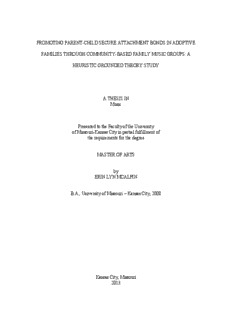
Promoting parent-child secure attachment bonds in adoptive families through community-based ... PDF
Preview Promoting parent-child secure attachment bonds in adoptive families through community-based ...
PROMOTING PARENT-CHILD SECURE ATTACHMENT BONDS IN ADOPTIVE FAMILIES THROUGH COMMUNITY-BASED FAMILY MUSIC GROUPS: A HEURISTIC GROUNDED THEORY STUDY A THESIS IN Music Presented to the Faculty of the University of Missouri-Kansas City in partial fulfillment of the requirements for the degree MASTER OF ARTS by ERIN LYN MCALPIN B.A., University of Missouri – Kansas City, 2008 Kansas City, Missouri 2013 © 2013 ERIN LYN MCALPIN ALL RIGHTS RESERVED PROMOTING PARENT-CHILD SECURE ATTACHMENT BONDS IN ADOPTIVE FAMILIES THROUGH COMMUNITY-BASED FAMILY MUSIC GROUPS: A HEURISTIC GROUNDED THEORY STUDY Erin L. McAlpin, Candidate for the Master of Arts Degree University of Missouri-Kansas City, 2013 ABSTRACT The purpose of this heuristic grounded theory study was to discover how community- based family music groups could foster bonding development in adoptive families. The subjects were 11 adoptive families with a total of 41 family members. Every adoptive family included at least one parent and at least one adopted child under three and one-half years old: siblings also participated. Data sources included three parental interviews, eight-weeks of parental journaling, and an eight-week Kindermusik® Wiggle & Grow family music class. Through the analysis of data three themes were identified: (a) healing awareness, (b) acceptance awareness, and (c) compassion awareness. These three themes then informed the development of a conceptual summary of community-based family groups to promote parent-child secure attachment bonds. iii APPROVAL PAGE The faculty listed below, appointed by the Dean of the Conservatory of Music and Dance have examined a thesis titled “Promoting Parent-Child Secure Attachment Bonds in Adoptive Families Through Community-Based Family Music Groups: A Heuristic Grounded Theory Study,” presented by Erin L. McAlpin, candidate for the Master of Arts degree, and certify that in their opinion it is worthy of acceptance. Supervisory Committee Deanna Hanson-Abromeit, Ph.D., Committee Chairperson Conservatory of Music and Dance Melita Belgrave, Ph.D. Conservatory of Music and Dance Loyce Caruthers, Ph.D. School of Education Joy Granade, M.M Kindermusik Educator, Program Director iv CONTENTS ABSTRACT……………………………………………………….……………………..iii LIST OF ILLUSTRATIONS………………………….…....………………….....………xi LIST OF TABLES……………………………………………………………...….….…xii ACKNOWLEDGMENTS……………………………….…………………......….........xiii PREFACE………………………………………………….………………......…....…..xiv Chapter 1. INTRODUCTION…………………………………………………….…………..1 2. REVIEW OF LITERATURE…………………………………………….……….6 Attachment Theory…...……………………………….…………………..8 Organized Behavioral System……………..……...……………….9 Attachment System………………………………..……………..11 Secure Base Behavior……………………………………………12 Safe Haven……………………………….………………………12 The Attachment Bond………………...………………………….13 Internal Working Model……………...………………………….13 The Strange Situation Assessment………...……………………..14 Interpersonal Neurobiology……………….……………………………..16 Emotion…………………………………………..………………17 Memory…………………………………………………………..18 Attachment…………………………………………...…………..20 Adult Attachment Interview…………………….……….20 v Direct Correlation of Parent-Child Attachment……………………………………….21 Shame Resilience Theory……………………..…………………………24 Shame……………………………………………….……………25 Empathy………………………………….………………………26 The Experience of Adoptive Families…………………...………………29 Becoming a Parent……………………….………………………29 Not-Yet-Mourned Losses…………………...……………35 Becoming a Son or Daughter………………………….…………36 Belonging to One Another……………….………………38 Theoretical Framework…………………………………………..………39 Music Therapy…………………………………………...………………41 Music Therapy with Adoptive Families…………..…..…………41 Music Therapy, Bonding and Attachment……………..………..42 Attachment-Based Intervention…………………….……………45 Community Music Therapy…………....……………...…………45 Kindermusik®…….…….……..…………………………….……47 Statement of Problem and Conclusion…………….……………………..50 3. METHODOLOGY………………………………………………...…………….52 Rationale for Qualitative Research…………………………………...….53 Grounded Theory……………………………………...…………54 Heuristic Tradition…………………………………………...…..55 Design……………………………………………………………………56 Recruitment Process……………………………………………...56 vi Inclusion Criteria and Extended Family Members………………57 Materials…………………………………...…………………….58 Adoptive Parents……………………………………...………….59 Adopted Children and Siblings…………………………………..60 Setting………………………………………………………...….60 Kindermusik® Wiggle & Grow Class………………...………….61 Data Sources……………………………………………………………..63 Interviews……………………………………………..………….63 Informal Conversational Interview…………………..…..64 Interview Guide Approach…………………………...…..65 Standardized Open-Ended Interview………………...…..65 Documents…………………………………………………….…66 Observations…………………………………………..…………67 Confidentiality………………………………………………...…………70 Data Analysis………………………………………………...…………..71 Heuristic Inquiry and Grounded Theory………………..………..74 Limitations and Ethical Considerations………………………………….76 4. RESULTS……………………………………………………….……………….79 Understanding Adoptive Families………………………………...……..85 Unfinished Dream………………………………………….…….86 Grounded……………………………………………………..…..87 Connection…………………………………………………...…..88 Abandonment of Adoptive Parent……………………………….89 vii Belonging of the Adopted Child…………………………..……..89 Findings………………………………………………………………….90 Healing Awareness…………………………………………...….90 Healing Awareness: Unresolved Experiences……….…..91 Healing Awareness: Seeking Comfort…………………...94 Healing Awareness: Seeking Perspective……………..…98 Acceptance Awareness……………………………………..…100 Acceptance Awareness: Need Awareness…………...…101 Acceptance Awareness: Child Awareness……………..101 Compassion Awareness……………………………………….101 Compassion Awareness: Support Awareness…………..102 Compassion Awareness: Attachment Awareness………102 Summary of Interview and Journal Themes………….……….102 Role of Community-Based Family Groups…………...……....103 Developing or Repairing a Sense of Safety…….………103 Relationship Repair…………………………………….104 Family Support…………………………………………105 Facilitating Attachment Security………...……………..105 Developing Communication………………..…………..106 Understanding, Developing or Maintaining Inter-subjective Experiences…………………..107 Research Questions………………………………………………..……114 5. DISCUSSION…………………………………………………………………..117 What I Have Learned………………………………………….……..…118 viii Conceptual Summary……………………………………………...……121 Recommendations for Program Development……………………...…..126 Parental Acceptance of Self……..…..………………………126 Parental Compassion for Self…………..…….……………..127 Community-Based Family Groups………………...……….127 Conclusion………………………..…………………………….……..128 Future Research…….…..…….……………………………………….133 Appendix A. CLASS FYLER………………………………………………………………...135 B. RECRUITMENT EMAIL………………………………………...……………136 C. RECRUITMENT EMAIL FOR ADOPTIVE FAMILIES…………..…………137 D. CONSENT FOR PARTICIPATION………………………………….……..…141 E. WEEKLY JOURNAL QUESTIONS…..………………………………...…….148 F. WEEKLY PARENT EMAILS………………………………………………....153 G. PHOTOGRAPHES OF KINDERMUSIK CLASS LOCATIONS AND POSTERS………………………………166 H. PART 1. UNFINISHED DREAM………………………………………...……168 I. PART 2. GROUNDED…………………………………………………..……..170 J. PART 3. CONNECTION…………………………………………..…………..171 K. PART 4. ABANDONMENT OF THE ADOPTIVE PARENT…………………………………………….....…172 L. PART 5. BELONGING OF THE ADOPTED CHILD………………………………………………......…173 M. PERMISSION FOR FIGURES………………………………...……………….175 ix REFERENCE LIST…………………………………………………………….…..…..177 VITA……………………………………………………………………………………190 x
Description: